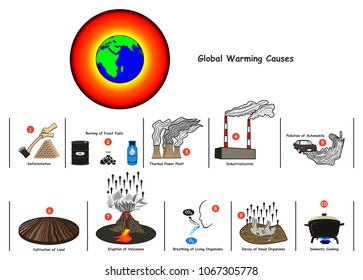
Global climate change is a major topic that will affect the lives of everyone on the planet. Scientists have studied the impacts of this phenomenon in numerous ways. The impacts range from changing the weather patterns to the reduction of biological diversity. It is crucial that governments take action to limit the negative effects of this trend.

A bibliometric survey was undertaken to obtain a comprehensive picture of the global research on climate change. It aims to compare the scientific output of different countries and regions to determine the most important aspects of the issue. This was done by evaluating a 40,062 article database on climate change. These articles were taken directly from the World of Science data base. The comprehensive assessment of the current state of the art was possible through the analysis of publications that were based on technological, ecological, and socioeconomic factors.
Scientists have discovered that the ocean's heat content has increased dramatically over the last few decades. Additionally, the Arctic is heating up more than twice as fast as the rest of the world. Consequently, sea levels are rising at a rapid rate. As a result, cities of great size and coastal ecosystems around the globe are most at risk from the negative effects of climate change.
While scientists have studied many factors that affect the Earth's energy balance and developed sophisticated models to predict what the future will bring, they also have used advanced models to predict how it will change. Most of these models indicate that the developing nations are suffering from severe climate impacts. These models can't reproduce the actual events. Hence, reliable estimation of the changes caused by climate change is the heart of research.
Although scientists have collected a lot more evidence in support of global warming, it is still difficult for them to accurately project its actual effects. A reliable estimate of the impacts of climate change will form the basis of all mitigation strategies. Global Climate Risk Index is a data source that provides information on the severity and frequency of weather events for various years.

Another indicator of global temperature change is the increasing rate at which greenhouse gas levels have been rising. Research has shown that the rate at which greenhouse gas concentrations have increased over the last century is unprecedented. Because human activities have increased the level of CO2 in our atmosphere, this is why it has been so dramatic. These gases absorb more of the Sun’s warmth. Research has shown that the rate in which the Earth's temperature has increased over the past century is 10x faster then that over the last decade.
Melting ice sheets and rising heat in the ocean are two other signs that the earth's surface is changing rapidly. These changes can have a devastating impact on human life, including the supply of food and water. Already, signs are emerging that climate change will lead to an increase in extreme weather events. Despite many indicators of climate change, governments have yet not taken meaningful action to limit its effects.
FAQ
What are the implications of climate change for the environment and society?
Climate Change can have broad impacts on society as well as the environment. Climate change is causing a variety of environmental problems, including rising temperatures, extreme weather, sea level rise, and reduced air quality. These changes can have severe consequences for human populations. They can lead to instability, increased poverty, insect-borne diseases and altered migration patterns.
Climate change is already having a wide range of sweeping effects on the environment and societies all over the world. As global temperatures continue to rise, this is likely to worsen in the near future.
One of the most widespread effects of climate change is the rising ocean levels due to melting of ice caps. This results in shoreline erosion on many coasts, as well as increased flooding risk for coastal communities. Saltwater intrusion is also a problem, and can negatively impact freshwater supplies along the coasts of many countries.
Many countries are experiencing extreme weather events, such as droughts or heatwaves as a result climate change. These events result in mass destruction of homes or businesses and can lead to relocation or complete loss of life. Intense storms increase the risk of flooding and landslides. This can further damage infrastructure like roads, railways, and bridges.
Climate change is also causing wildfires to become more frequent than ever before. This can have devastating effects on habitats as well as people living near them.
This drastic change in living conditions is often a result of displacement or even refugee situations. When people decide to leave their homes, either involuntarily or voluntarily, it can be because their town has become too dangerous or not habitable due the changed climate conditions.
Dust storms are also increasing in severity worldwide due to increased aridity. This makes it more difficult for asthma sufferers and other respiratory conditions. Furthermore, pest infestations are predicted to rise in tandem with warmer temperatures. This phenomenon is known as the 'greenhousebug'. Global food insecurity will continue to grow as fewer crops have lower nutritional qualities. This could potentially lead to more hardships for people already struggling to make ends work.
What are the roles of greenhouse gases in climate changes?
Greenhouse gasses are key to climate change. They act as an invisible layer around the Earth trapping infrared radiation. This warms the atmosphere. Without them the planet would be much more colder than it currently is.
These greenhouse gases are created by human activity such as burning fossil fuels. As these activities continue to increase, more heat gets trapped in the atmosphere, leading to rising temperatures and extreme weather events.
The most prevalent greenhouse gas is carbon dioxide, which is released from fossil fuels, such as oil, gas, and coal. Methane (CH4), nitrous oxide (N2O), and fluorinated gases (F-gases) are also major contributors to climate change.
Since preindustrial times, the concentration of greenhouse gases has risen significantly due to human activity. This has led worldwide warming and increased temperatures in the oceans as well as all over the planet. It is also causing changes such as more intense storms and droughts, melting glaciers, and rising sea levels.
To prevent further climate change-related damage, humanity must reduce its greenhouse gas emissions by moving away from fossil fuels and towards renewable energy sources like wind or solar power. We can also take measures such as reforestation or adopting agricultural methods that allow the soil to absorb more CO2 from the air. These activities will reduce atmospheric greenhouse gas concentrations and create a healthier environment that supports all life.
What is the impact of climate change on biodiversity and ecosystems?
Climate change is having a wide range of effects on biodiversity as well as ecosystems. Rising temperatures, changes in extreme weather events and sea levels, as well as increased acidity in the ocean are just some of the issues affecting wildlife and ecosystems today.
These changes can result in shifts of habitat areas, disrupting food chains or affecting population numbers or distributions. With potentially devastating consequences for biodiversity, ecosystems and their functioning, these shifts in climate conditions could cause significant impacts. Hydrological changes can also impact water availability for aquatic species.
Climate changes can lead to higher temperatures and more frequent extremes (such as droughts) which put more stress on already fragile systems, like coral reefs or tropical forests. Up to 30% of all animal species could be extinct by 2050 due to climate change, which would lead to further losses in ecological communities.
Climate change poses a grave threat to biodiversity, but also to human societies that are dependent on functioning ecosystems to provide food, fresh water and timber. The best way to minimize its impact is to work at every level to reduce global warming trends. Future damages can be avoided with prudent management practices.
What are the causes and consequences of climate change?
Climate change is a worldwide phenomenon caused by an increase of human-generated greenhouse gasses emitted into the atmosphere. This is mainly due to fossil fuel burning for power and transportation. These emissions lead to a greater amount of sun's energy being trapped in Earth’s atmosphere, which results in rising temperatures.
Other factors contributing to climate change include population growth, land clearing and destruction of ecosystems, deforestation, energy consumption, and over-grazing. This reduces the amount of carbon sinks naturally found in the atmosphere that absorb CO2. Climate change may also be caused by natural factors such as changes to solar radiation.
This combination of human activities results in Earth exceeding its ability to balance its energy budget. The result is an average global increase of 1° Celsius since pre-industrial days. Glaciers are melting faster than they become and sea levels are rising as the oceans absorb most of the heat energy. Other consequences include water shortages, droughts, and extreme weather events such as floods and hurricanes that are caused by heavy rainfall on saturated soils.
To protect ourselves from further damage, it is essential for us to reduce our carbon footprint and start curbing our emissions now so that we have a fighting chance against the already significant impacts of climate change. Along with reducing our dependence upon fossil fuels to generate electricity, it is important to invest in renewable sources like wind turbines or solar cells that do not emit harmful pollutants into nature. Other sustainable practices like reforestation can also help restore some balance around these delicate planetary cycles we rely on for survival.
Statistics
- Fossil fuel production must decline by roughly 6 percent per year between 2020 and 2030. (un.org)
- This source accounts for about 10% of all the water that enters this highly productive farmland, including rivers and rain. (climate.nasa.gov)
- features Earth's average surface temperature in 2022 tied with 2015 as the fifth warmest on record, according to an analysis by NASA. (climate.nasa.gov)
- features Earth's average surface temperature in 2022 tied with 2015 as the fifth warmest on record, according to an analysis by NASA. (climate.nasa.gov)
- According to the 2014 report on Climate Change Impacts, Adaptation, and Vulnerability (page 8) from the United Nations Intergovernmental Panel on Climate Change, governments at various levels are also getting better at adaptation. (climate.nasa.gov)
External Links
How To
How to include sustainable practices in your daily life to combat climate changes
Reducing your consumption of energy and food is one way you can integrate sustainable practices into your day. Instead of buying new items every day or week, try shopping secondhand or borrowing items from friends and family members. Additionally, eating vegetarian meals once or twice a week can help reduce the amount of methane released into the atmosphere from livestock production. For energy conservation, remember to turn off the lights whenever possible when leaving a space.
You can also reduce the emissions from transportation sources such as cars, planes and trucks by using carpooling and public transit to transport your passengers instead of driving. In place of traditional fossil fuels, we can choose to use renewable power sources such solar panels to generate electricity at our homes. To make climate change action effective, it is important to support policies that promote clean air regulations. In conclusion, it is extremely beneficial to work with others on issues like ending plastic pollution or deforestation. It creates more citizens who are aware and will act upon that knowledge.